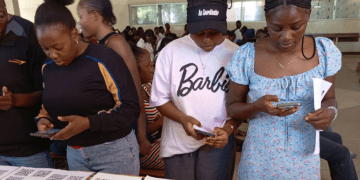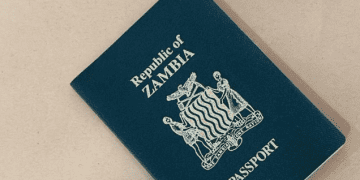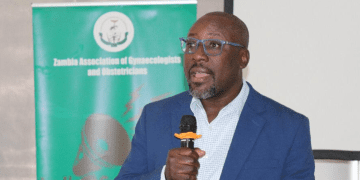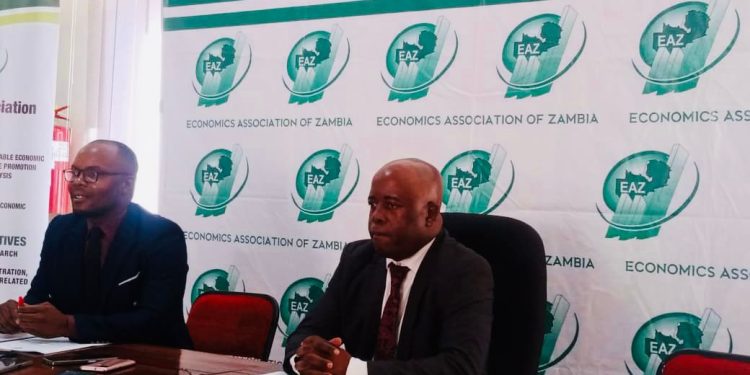Lusaka, Zambia – 26th March 2025 – The Economics Association of Zambia (EAZ) has sounded the alarm on Zambia’s economic outlook, calling for swift, data-driven policy interventions to steer the nation away from looming instability. At a press conference held at the Jesuit Centre for Theological Reflection (JCTR), EAZ President Dr. Oswald Mungule delivered a comprehensive assessment of the state of the economy, outlining stark challenges, cautious optimism, and clear recommendations.
Dr. Mungule noted that 2024 was marred by persistent inflation, currency depreciation, and climate-induced disruptions, particularly in agriculture and energy. “Our economy is at a pivotal moment,” he stated. “The need for bold and well-coordinated policy action has never been more urgent.”
Grim 2024 Performance
EAZ reported Zambia’s GDP growth was revised sharply downward—from an expected 4.8% to just 1.2%, according to the IMF. Key drivers of this decline included a severe drought that cut agricultural output by over 31% and caused daily power cuts of up to 21 hours. Inflation closed the year at 16.7%, far above the target range of 6–8%.
Meanwhile, Zambia’s debt-to-GDP ratio ballooned to 79.2%, with total external public debt reaching $21.6 billion by the end of 2024. A fiscal deficit of 6.4% underscored the strain on public finances, exacerbated by low revenue collection and increased social spending due to drought impacts.
Sectoral Snapshot: Mixed Fortunes
- Mining showed resilience, with copper output increasing 12% thanks to operational recoveries at key mines.
- ICT and tourism defied the odds, with digital growth and a 35% rise in tourist arrivals, respectively.
- Agriculture, manufacturing, and energy sectors, however, bore the brunt of drought-induced hardships and operational inefficiencies.
2025: A Year of Reckoning?
While the IMF projects GDP growth of 6.6% in 2025, EAZ cautioned against over-optimism. Ongoing power shortages and the lingering effects of agricultural disruptions may hinder recovery. January inflation slightly rose to 16.8%, and the kwacha hovered near historic lows, trading at K27.95 per US dollar.
EAZ also expressed deep concern over the recent 15% export tax saga on gemstones. The back-and-forth decision by government—imposing and then suspending the tax within weeks—has dented investor confidence. “Minerals are non-renewable. We must derive maximum value from them,” Dr. Mungule warned.
Introduction of New Banknotes
The government’s move to introduce redesigned banknotes effective 31st March 2025 was welcomed in principle, but EAZ cautioned against poor implementation. While enhanced security and liquidity benefits are expected, risks such as inflation shocks and public confusion must be managed through robust public education and stakeholder coordination.
Fallout of U.S. Aid Suspension
EAZ also raised the alarm over the recent suspension of U.S. aid following Executive Order 14169 by President Donald Trump. Zambia, which receives an average of $374 million annually in U.S. support—mostly for health, education, and governance—is now bracing for the social and economic fallout.
“The sudden withdrawal threatens HIV/AIDS treatment programs, teacher training, and transparency reforms,” Dr. Mungule said. EAZ urged the government to quickly seek alternative partnerships and ramp up domestic revenue mobilisation.
Key Recommendations
To navigate this turbulent period, EAZ proposed:
- Diversifying the economy beyond copper through support to agriculture, tourism, and manufacturing.
- Expediting debt restructuring, especially with commercial lenders.
- Improving tax compliance and broadening the tax base.
- Accelerating energy diversification with greater investment in solar, coal, and nuclear power.
- Protecting social sectors in light of donor unpredictability.
Final Word
In his closing remarks, Dr. Mungule emphasised that Zambia’s current challenges, though grave, are not insurmountable. “With coordinated efforts, strong leadership, and evidence-based policymaking, Zambia can chart a path toward stability and shared prosperity.”
For more information, visit www.eaz.org.zm or contact the EAZ Secretariat at secretariat@eaz.org.zm.








































